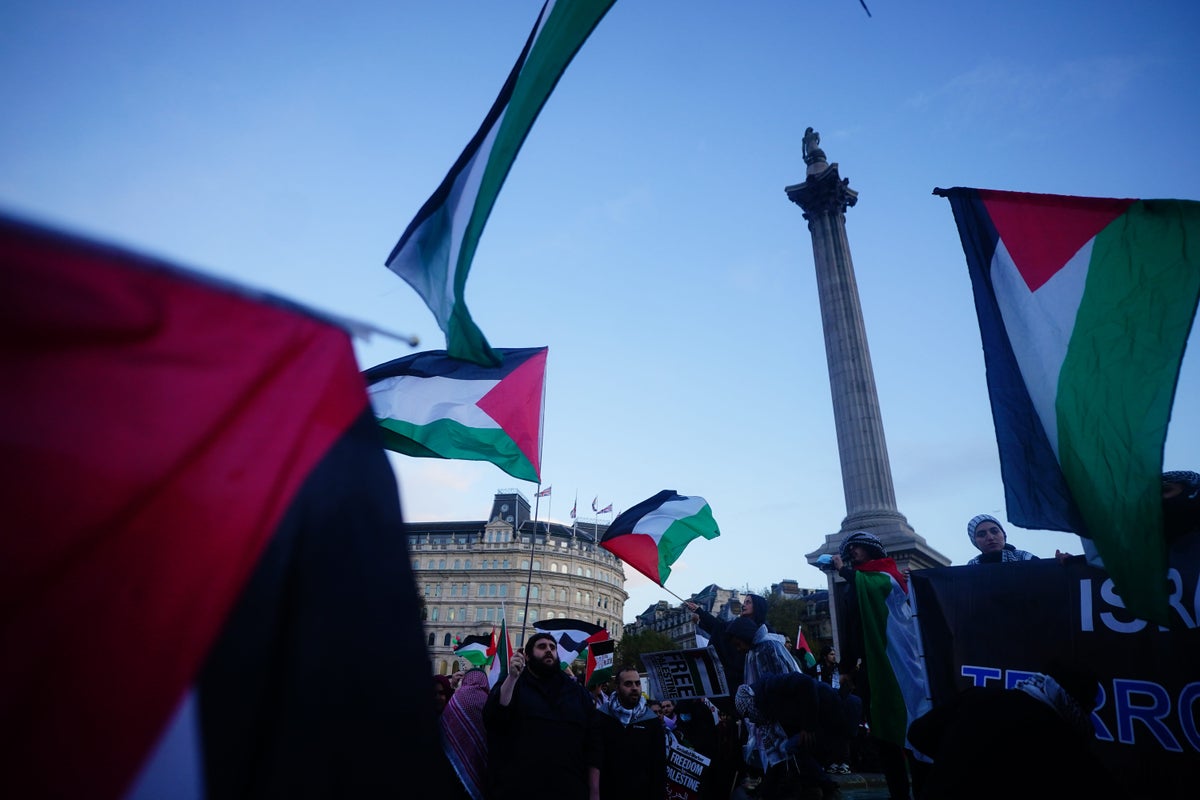
The Metropolitan Police have said fireworks were directed at officers and a pamphlet reported to support Hamas was on sale at a pro-Palestinian march in central London.
Six people have been charged after protests in the capital on Saturday, Scotland Yard said.
Five were charged with failing to comply with conditions imposed under the Public Order Act, and one was charged with failing to comply with a direction given under the Anti-social Behaviour, Crime and Policing Act, the force said.
One arrest was made on Sunday morning for a public order offence after a man was allegedly heard making antisemitic comments in Parliament Square.
We will take action on any placards being carried at protests which are inflammatory and incite racial hatred, or purport to be supporting a proscribed organisation— Commander Karen Findlay
Prime Minister Rishi Sunak and Home Secretary Suella Braverman have already expressed concern about the prospect of further pro-Palestine protests next Saturday, which could clash with Armistice Day.
The Met said it “fully appreciated the national significance of Armistice Day” and pledged to deploy thousands of officers in an “extensive security operation”.
“We will use all powers and tactics at our disposal to ensure that anyone intent on disrupting it will not succeed,” the force added.
But pressure group Campaign Against Antisemitism called on Met Commissioner Sir Mark Rowley to use his powers under section 13 of the Public Order Act 1986 to ban next week’s march.
“Section 13 powers allow the police to prohibit processions if other powers under the Act do not suffice to prevent serious public disorder. As we have seen over the past month, that threshold is now met,” the group said.
Deputy Prime Minister Oliver Dowden voiced “grave concerns” over the scheduling of a pro-Palestinian march on Armistice Day.
Speaking to Sky News’s Sunday Morning With Trevor Phillips programme, Mr Dowden highlighted the sensitive nature of the day and pointed out that such demonstrations could possibly lead to unrest or be misconstrued as a sign of intimidation, especially towards the Jewish community.
“I think that, at a time that is meant to be a solemn remembrance of the sacrifice of previous generations and upholding our British values, I think the police need to think very carefully about the safety of that demonstration,” he said.
Four police officers were injured during Saturday’s protest after thousands of demonstrators gathered in Trafalgar Square.
Protesters climbed on the square’s famous fountains as the mostly peaceful group waved flags and banners.
At least one protester was carrying a banner which read “Let’s keep the world clean”, with a picture of an Israeli flag being thrown into a bin.
Other protesters chanted “from the river to the sea, Palestine will be free”, despite controversy around the slogan’s meaning.
There were scuffles with the 1,300 police officers on duty as the evening went on, and smaller groups of protesters began moving away from the square.
Commander Karen Findlay said the Met would be “sharper” in its response at future protests.
She said: “We will take action on any placards being carried at protests which are inflammatory and incite racial hatred, or purport to be supporting a proscribed organisation.
“These are offences and any such banners or material will be assessed by the Met’s Counter Terrorism Command.
“As in recent weeks, we have been speaking to the organisers of the pro-Palestine march to discuss yesterday’s demonstrations. We will continue to speak to them across this week as part of our ongoing planning for the weekend’s Remembrance events and will monitor and review all information available to us.”







